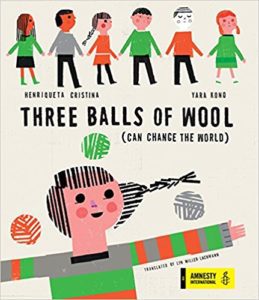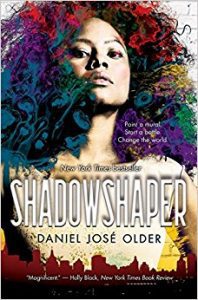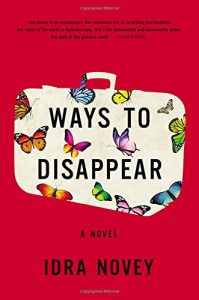The Time Has Come for Three Balls of Wool (Can Change the World)
When my editor at Enchanted Lion, Claudia Bedrick, contacted me about translating Henriqueta Cristina and Yara Kono’s Com 3 Novelos (O Mundo Dá Muitas Voltas) into Three Balls of Wool (Can Change the World), it seemed like one of those coincidences that are all too common in fiction but never happen in real life. After all, I was in the process of writing a historical novel for teen readers set in Portugal in the same time period, about young people resisting a savage dictatorship that deliberately sought to keep them uneducated and illiterate in order to control them.
 Of course, I jumped at the chance. I also mentioned to Claudia that the founder of Amnesty International, Peter Benenson, started the organization in 1961 after hearing about two Portuguese students imprisoned for publicly speaking out against the Salazar regime. Amnesty International USA signed on to co-sponsor the book, which now includes a preface tying the family’s story to the refugee crisis today and a young-reader-friendly version of The International Declaration of Human Rights (something which, aside from the beautifully-illustrated story, every home should have).
Of course, I jumped at the chance. I also mentioned to Claudia that the founder of Amnesty International, Peter Benenson, started the organization in 1961 after hearing about two Portuguese students imprisoned for publicly speaking out against the Salazar regime. Amnesty International USA signed on to co-sponsor the book, which now includes a preface tying the family’s story to the refugee crisis today and a young-reader-friendly version of The International Declaration of Human Rights (something which, aside from the beautifully-illustrated story, every home should have).
Three Balls of Wool portrays a family that flees Portugal in the mid 1960s, arriving in Czechoslovakia because, according to the eight-year-old narrator’s father, it’s a place “where all children go to school.” While she and her brothers do attend school and quickly learn a new language and make friends, their parents are not as happy. The drab buildings, dreary weather, and sweaters available in only three solid colors symbolize the lack of freedom in their new land. But the girl and her mother get the idea to change things up, and in doing so, this refugee family brings about positive change in the place where they have come to live.
Publishers Weekly has called Three Balls of Wool, “a quiet and sensitively observed look at a family’s efforts to stay safe in uncertain times.” And Kirkus — generally a tough critic — uses the word “timely” multiple times while saying the book “gently introduces the trauma of exile to young readers and can lead to discussions and, hopefully, a better understanding of being uprooted….A timely story of refugees and the strength of individuality over conformity.”
 While the political events of the past year have forced people in the United States to turn inward — from the insular “America First” sentiment that brought the current government to power to the self-questioning, “How could this have happened?” — this is also a time to look outward. We need to make the connections with others around the world that our leadership is renouncing, as exemplified by the states and cities that have continued to pursue the climate guidelines of the Paris Accords. But we also need to look at the experiences of those in other countries, in the past and present, who have faced and resisted nationalism and tyranny. In this way, Three Balls of Wool is an example suitable for even the youngest readers. It portrays the experience of exile, but it also portrays the effort to capture a bit of freedom in a place where freedom has been taken away.
While the political events of the past year have forced people in the United States to turn inward — from the insular “America First” sentiment that brought the current government to power to the self-questioning, “How could this have happened?” — this is also a time to look outward. We need to make the connections with others around the world that our leadership is renouncing, as exemplified by the states and cities that have continued to pursue the climate guidelines of the Paris Accords. But we also need to look at the experiences of those in other countries, in the past and present, who have faced and resisted nationalism and tyranny. In this way, Three Balls of Wool is an example suitable for even the youngest readers. It portrays the experience of exile, but it also portrays the effort to capture a bit of freedom in a place where freedom has been taken away.
 On Monday, October 2, the day before Three Balls of Wool launched, I attended another panel at the Strand Bookstore sponsored by PEN America. This one featured the award-winning YA author for Shadowshaper Daniel José Older and translator Idra Novey, whose debut novel featuring a translator searching Brazil for her missing author, Ways to Disappear, has become a surprise hit. Novey lives part of each year in Chile, and in talking about the current administration, she compared the atmosphere of polarization and distrust to that of the Pinochet regime, where neighbors denounced each other to the secret police (as they’re currently doing to allegedly undocumented individuals to ICE) and “everybody knew” who supported or opposed the regime. Both Novey and Older agreed that times of self-questioning in the United States — such as during the Vietnam and Iraq Wars, and now — have led to increased interest in international literature, in books in translation, and in books set in similar eras of history.
On Monday, October 2, the day before Three Balls of Wool launched, I attended another panel at the Strand Bookstore sponsored by PEN America. This one featured the award-winning YA author for Shadowshaper Daniel José Older and translator Idra Novey, whose debut novel featuring a translator searching Brazil for her missing author, Ways to Disappear, has become a surprise hit. Novey lives part of each year in Chile, and in talking about the current administration, she compared the atmosphere of polarization and distrust to that of the Pinochet regime, where neighbors denounced each other to the secret police (as they’re currently doing to allegedly undocumented individuals to ICE) and “everybody knew” who supported or opposed the regime. Both Novey and Older agreed that times of self-questioning in the United States — such as during the Vietnam and Iraq Wars, and now — have led to increased interest in international literature, in books in translation, and in books set in similar eras of history.
The panelists spoke mainly about literature for adult readers — where I have seen increased interest in historical fiction, fiction with international settings, and books in translation. I hope that Three Balls of Wool, which offers all three, is the start of a similar trend in literature for children.







What a wonderful opportunity for you, Lyn! So glad you were able to translate this book! I’d love to read Three Balls of Wool (Can Change the World).
Thank you! I’m eager to hear your thoughts when you do read it.